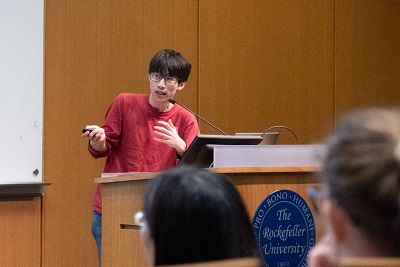The common thread in severe COVID-19
Patients who suffer from severe COVID-19 tend to have one thing in common: insufficient or defective proteins that help regulate the immune system, known as type I interferons (IFNs).
Two papers from the laboratory of Jean-Laurent Casanova previously demonstrated that at least 10 percent of severe cases can be chalked up to either a genetic condition that cripples IFN production, or misguided antibodies that attack those crucial proteins. Now, two new studies in Science Immunology from the Casanova lab explain how another 10 percent of severe cases are also linked to IFN.
“We can neatly explain much of severe COVID-19 as a net defect in type I IFN,” Casanova says. “To an extent never seen for any other acute infectious disease, these four studies collectively provide a molecular and immunological explanation for about 20 percent of critical cases.”
The new papers highlight additional IFN-related defects unique to severe and fatal COVID-19 cases. In the first study, Casanova and colleagues found that one to two percent of men under the age of 60 who experience severe COVID-19 have deleterious mutations in TLR7, a gene within the X chromosome that is involved in the production of type I IFN. In the second study, the scientists demonstrated that confused antibodies attacking type I IFNs instead of the virus account for a greater number of severe cases than previously thought—20 percent of people who died from COVID-19 had high levels of autoantibodies that specifically target and destroy IFNs.
These autoantibodies are found even in uninfected individuals, which suggests that they are a cause, rather than an effect, of severe COVID-19. While they are in only about 0.5 percent of people under age 60, that number rises to four percent at age 70 and up to 7 percent by age 85.
These findings, resulting from the collaboration of the COVID Human Genetic Effort, an international global consortium co-led by Casanova, have immediate clinical implications.
Because it is quick and inexpensive to test for autoantibodies, Casanova and his team advocate screening to identify people most likely to suffer severe infection. Individuals who test positive for autoantibodies should be prioritized for vaccines, including a third booster shot. If they contract COVID-19, such high-risk patients should be hospitalized preemptively, and should receive monoclonal antibody or interferon therapy. The scientists also caution that blood plasma donations should be screened for autoantibodies and excluded from donation if they contain proteins capable of attacking IFNs.



